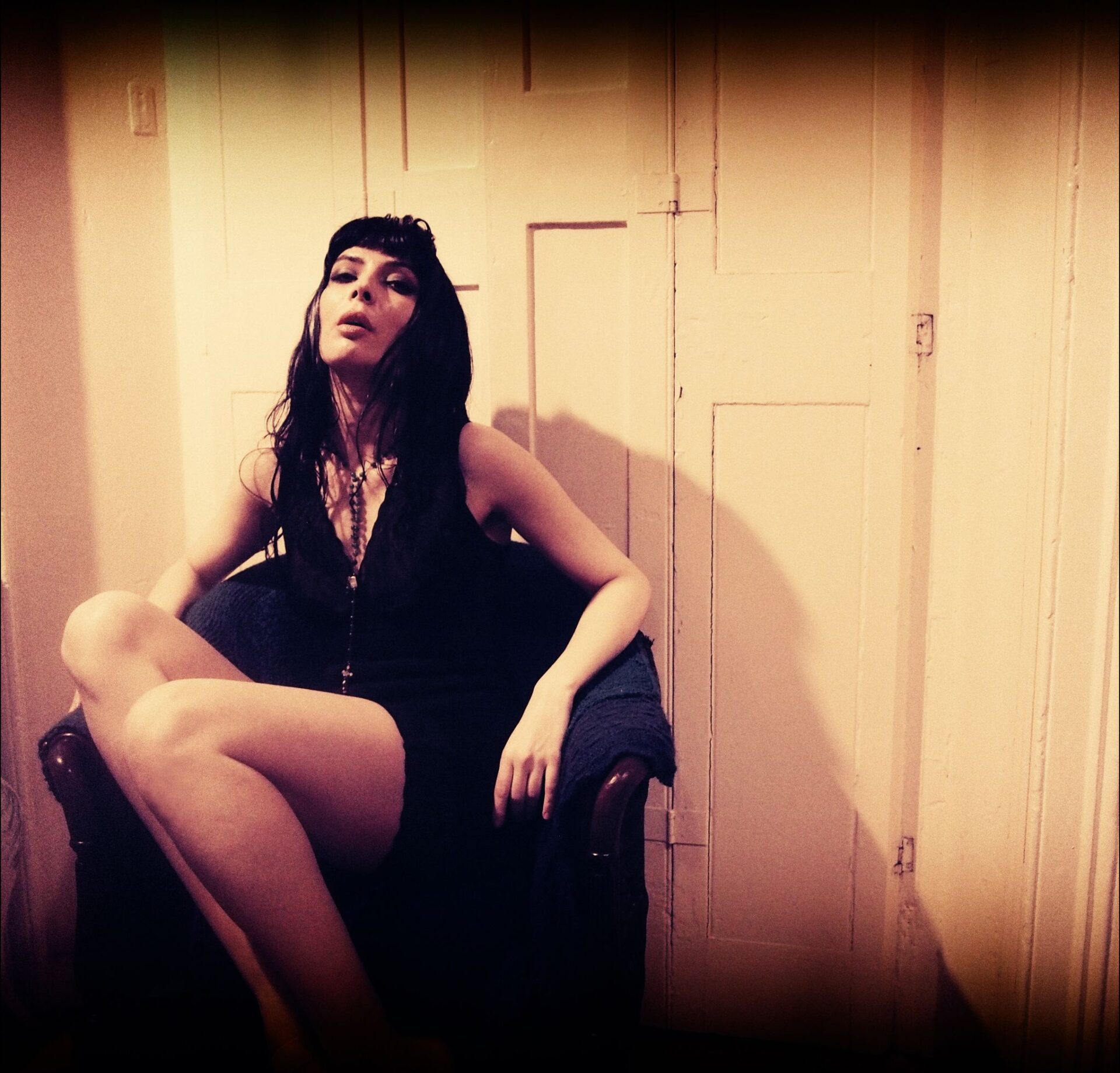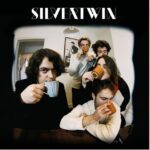Sofia and Crispin of Starsha Lee discuss their onstage chemistry, being ‘Yoko Ono’, the myth of originality, Lydia Lunch and how being called a riot grrrl is ridiculous.
Interview By John Clay
Self portraits By Sofia Martins Gray
Hey guys, thanks for this opportunity to interview you. Let’s jump right in: What positive aspects of your patch of the underground scene would you like to cite here?
Crispin: It’s difficult because venues in the UK on the whole are not great, to be honest. My experience of other countries, especially on the continent, is that they have better facilities. But fortunately many of the promoters and bands here are great to work with. They, and of course the audiences, make it worthwhile.
Sofia: I’m completely new to this as you know, I have no history, but I would say it’s a very positive fact that I’ve met many people who are very dear to me and I’m thankful for their kind support. The underground scene is made up of lovely people.
Does the context of where you’re playing have a beneficial effect on the receivership of your message. Does playing in a gallery for example hold an allure for you over a pub venue?
Sofia: I love playing in art galleries! We played in a couple of them and I always feel that’s my type of atmosphere. The audience tends to be more concentrated in a more conceptual way rather than a rock n roll way, if that makes sense.
Crispin: I don’t like playing in places that are not set up for it. For me it’s extremely difficult to put on the show I intend without knowing that it sounds half decent. Also, I don’t care if I sound like a prima donna, but having some kind of half decent dressing room makes a world of difference.
Sofia can you expand on the power of context in order to deliver an artefact’s function, and Crispin, if you could detail your need for UK shows to meet their counterparts outside the country? Why is there a difference in quality?
Sofia: I always felt supported by the people I worked with and the bands too. That creates in you a welcome feeling that helps you expand better on stage. There were a few shows that were out of my comfort zone but, when that happens, I hold onto my words/lyrics. I always make sure of what I want to say and that’s a very strong energetic field.
Crispin: Well, there’s always exceptions of course, but on the whole the venues seem more purpose built for live music and so on. They usually have decent size, clean dressing rooms, and often even provide an onstage monitor engineer for instance. I’m amazed at how unimportant these kinds of things seem to be for some people but for me they can make all the difference.
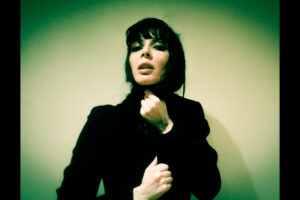
Do you think the lack of value for such responsibilities is indicative of live music’s lodging in pop culture? Would we be able to cite such a wide consensus in theatre or film for example? Why is there so much bad curation associated with live music?
Crispin: I guess it all boils down to money (as things usually do). I don’t know for sure if I’m correct about this – but I think the arts in some countries are actually subsidised to some degree. I’m not aware of that happening here – at least not for rock/rap/pop music. In other words I guess promoters here have to keep costs as low as possible or if it’s just not worth doing it (which I certainly don’t blame them for).
Germany subsidises live music in such a lucrative way that I knew a band that moved over there from the UK to milk that aspect for all its worth. Another band, Legpuppy, share your thoughts and praises of live shows being more worthwhile financially than here in Britain. On a slightly related note, what do you both think needs to change in terms of social inclusion on the underground scene?
Crispin: Social inclusion? I’m not entirely sure but I suppose I could say the same as I would for any other walk of life – no sexism, racism, ageism and so on. Sorry, that’s a bit general, I know.
That’s fine. How about you Sofia? You’ve had a fair few brushes with internalised sexism over the past few years.
Sofia: Well, I still struggle with the fact I cannot spontaneously take my shirt off without being judged in a very negative way. Also by women surprisingly. I never saw a man being judged in this way. Since childhood I faint when it’s too hot, and on stage I nearly fainted twice. One of the times was in an art gallery and I sang a whole song on the floor. So whilst I don’t explore nudity for attention (that’s the usual cheap shot) I also need to lower my body temperature. Normally I use water and I always apologise in advance to the sound people and bands for the possible watery mess on stage.

There seems to be more acceptance and understanding for your nipple exposure now than in early 2016 shows. What are your thoughts on this and do you have any thoughts on why your early detractors were women?
Sofia: I guess my message is more clear now after I wrote a couple of articles about it (available on Public Pressure). As I said in another place, I explore unconscious body movements like in Butoh dance, and use spontaneous vocal delivery some of the time. To be honest I don’t feel comfortable talking about the worst side of women because I think there’s enough of that in our culture already. Enough of blaming and shaming! But yes, I was very surprised when women, online, including musicians, put me down because of my performances. I’m not talking about when they put me down because of my high pitched voice, that’s their taste, and I also have my own aesthetic choices. I’m referring to their talk about my knickers and nipple display as a shameful attempt at getting attention.
Would you agree that there are more supporters of your decision making in the artistic space now, or are we risking naïvite here?
Sofia: I’m not sure to be honest, I do have a small group of people that support me, but normally I never venture to see how much of a fan base I really have. I’m too small to think about that, I have no notoriety yet.
What changes do you want to see occur on your portion of the underground scene and how do you feel you can contribute to it?
Sofia: I could give an appropriate answer if I was more active or more inside the scene. Actually, and this applies to my life since I’ve been in London, I only get out of the house to rehearse and do shows. I’m not a fan of pubs, I’m always on the verge of collapsing after shows so I go home straight to bed! So I don’t know what to say about possible changes inside the scene. As I said, everyone I come into contact with are all lovely people. I don’t think I can contribute to anything, Lydia Lunch already did it.
Can you clarify what you mean regarding Lydia Lunch?
Sofia: Since we’re talking about women in alternative music, let me confess that my favourite ones have been, and still are, Diamanda Galás and Lydia Lunch. I also like Kim Gordon for the fact that she seems to understand how to do rock n roll using concepts of the plastic arts movements. I always saw her as a modernist mindset person, a conceptual artist. But I don’t listen to Sonic Youth anymore.
Some characteristics that probably most people think only belong to the 90’s riot grrrl scene were already suggested by Lydia Lunch in the late seventies with her band ‘Teenage Jesus and the Jerks’… And I don’t want to bring up how much impact she might have had on Courtney Love, make of that what you will. If she had, there’s nothing wrong with that anyway. When I was younger I was very much into the so-called No Wave movement and she was undoubtedly a central figure. Lunch comes across as a very progressive and well read woman. She’s a poet, a musical provocateur. Very occasionally I still listen to her work with ‘No Trend’ (that band was great by the way), and of course, her work with the unique Rowland S. Howard. I don’t know what she’s doing these days to be honest.
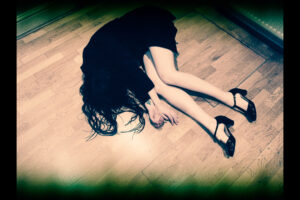
So when you say Lydia Lunch ‘already did it’, your outlook is to continue working using similar sensibilities rather than to actively update or progress beyond them, or is that unfair?
Sofia: My answer was addressing the simple way people tend to judge artists (or anything really), it’s the standard way unfortunately.
But yes, in the “women’s field” of rock music, a provocative performer with loud vocals, angular phrasing has happened before me, obviously. Does that make me Lydia Lunch? Obviously not. And this is where people tend to view things in a very limited way, and it seems to me the judgement inside the rock n roll community is poor. They portray themselves almost like fashion victims. One cannot use the same dress as somebody else, or it’s plagiarism. This is really poor. That doesn’t define a personality.
To me being original is a stigma and a myth. A trend that we assume we have to follow because industries create massified tendencies. I think there’s better recycling than others. Let us consider big examples: Picasso brought a novelty to the world, but could Cubism exist without Picasso visiting Matisse’s atelier – where he discovered African statuary? Most likely not.
And could Matisse have created Fauvism without the Impressionist thesis on light? Most likely not.
To the smaller examples: our eye is never naked, we have uncountable inputs every second and those inputs have meaning. Due to our limited memory and complex mental processing we are not aware of all those meanings but they come to light in what we do. I witness this in my own photography, and let me say once again, I’m not influenced by Francesca Woodman. Just because I’m a girl in an old house doesn’t mean I’m influenced by her. Here is where the interpretative mistakes come in. Things exist in depth not at the surface. I could go on forever about this, but I won’t.
In what I do I’m only interested in expressing my humanity the best I can.
By all means, carry on. I had an illuminating yet frustrating conversation the other night with a music reviewer who posited BTS (that K Pop boy band) as a group of cultural significance when the subject was the stagnation of culture over the last twenty plus years. I’d love to know theories as to why the scene you often play within has a fair few people who are looking for the next Lydia Lunch, Courtney Love at your gigs? Conversely, detractors are looking for the next Yoko Ono to hate on or Toyah Wilcox to poke fun at when ultimately, they refuse to acknowledge Sofia Martin’s Gray is onstage. No one else.
Sofia: I’ve been called Yoko Ono many times. The joke is on them because I respect her conceptual creativeness, she applied conceptual art to voice. It’s legit.
They are waiting for the new Courtney Love and Bikini Kill because the generation they belong to grew up with those underground scenarios as something “cool”, and “cool” is a very dangerous category. It’s a nostalgic perspective. Everytime someone compares me with one of the riot girls I find it laughable, especially in the UK. No one in the UK realises that in my country (Portugal) no one knows about the UK underground scene. Maybe two or three people in the whole country that, by the way, are alternative DJ’s or musicians. Comparisons are compulsive and reductive.
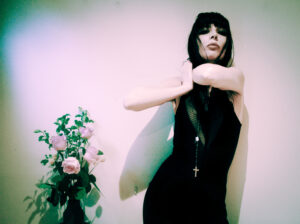
It still amazes me (it really shouldn’t), that Yoko Ono is still the go to word for closet or unwitting Misogyny. These sane people champion their feminist credentials whilst unskillfully selling her down the river. The legacy of a horrendous music press aside, I’d like to know how the two of you have benefited from working with the other. Crispin, maybe you’d like to go first?
Crispin: Our common ground has less to do with liking the same bands, or some era/genre (which I think neither of us actually really care about), and more to do with a point of view that I become aware of on stage particularly. For instance neither of us are remotely interested in selling sex (not that I think I could even if I wanted to). It’s something else entirely, but I don’t want to try and put it into words – it’s just a natural sense. Off stage we have a very similar lifestyle and certainly quite a similar view of imagery (paintings, photography or whatever).
Sofia: His guitar distortion matches my mood, but he likes the Rolling Stones, I’m more into Body Count.
The chemistry that you have onstage is a non sexual one then. How important is this to you and do you find this discovery unusual, given the legacy of influences such as The Rolling Stones?
Crispin: I have no idea if it appears sexual to anyone else or not, I just know I’m not thinking about anything like that (never have done) and neither is Sofia. I just like some of The Rolling Stones songs because I like how they go, the melody or rhythm or whatever, not because of what they´re about.
Sofia brings a lot of unique conceptual artistry to the sound you’re associated with the most. Can you pick a few ideas which stand out for you in terms of your own consideration as a musician?
Crispin: Well certainly lyrically Sofia comes up with things that I wouldn’t expect. And we both like this idea of breaking it down to nothing but a slogan – like in Post Modern. Her background in philosophy has provided a somewhat unusual approach that I really get on with. God knows why though, I know the names Kant and Nietzsche but I’ve never read any.
And now that you’re more familiar with those works has that offered you deeper insight into lyricists, bands and other artists that you’ve previously approved of?
Crispin: Well, when I first picked up a guitar I have to admit I really wasn’t interested in lyrics at all. I do realise now a lot of songs I liked in the past have dubious lyrics. So, yes, broadly speaking I have come to realise the words are actually very important, or can be anyway.
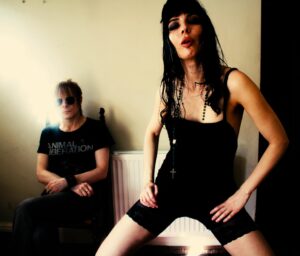
Sofia has gone on record as to gain ideas from everyday sounds or narrative perspectives from simple objects such as mirrors. Do you allow yourself to be open to new production trickery in a way less obvious than other records, and furthermore, has any of your recent philosophical interests provided a prism for such thoughtful execution?
Crispin: I’m open to every trick in the book! Whether or not I can achieve it successfully is an entirely different matter. But I’ll try anything, yes. My philosophy boils down to a quote from a very old American cartoon strip called ‘Pogo’, set in the deep US south. In it one of the characters is on trial and possibly going to receive hanging if found guilty (this was the 1940’s or 50’s). One of his friends, meaning well, says ‘don’t take life too seriously son, it ain’t no-how permanent!’. So, yes, I suppose I am encouraged to try whatever – I have little to lose.
Could you give an example of how this attitude plays out in the new material?
Crispin: The honest answer is no, I couldn’t – I don´t know if it does play out in the new material or not, or indeed ever has… I´m not that conscious of what I’m doing – I can’t see it from the outside because I´m inside it.
Sounds crucial. In wrapping up our talk it would be good to know a little bit more about the E.P that’s due to follow the single. A few words from the both of you ought to suffice.
Sofia: I have more control in this EP. Musically, and for the first time, I wanted to have more input. The lyric content is the usual, I wrote all the lyrics for Starsha Lee except one title! “People Are Horrible” title was Crispin’s, not mine.
Crispin: I try not to have any expectations. I won’t really know what it’s like until it’s done. Trying to do something we like is hard enough but we’ll give it everything we’ve got.
“Killing Heteronomy” is available on Bandcamp.


